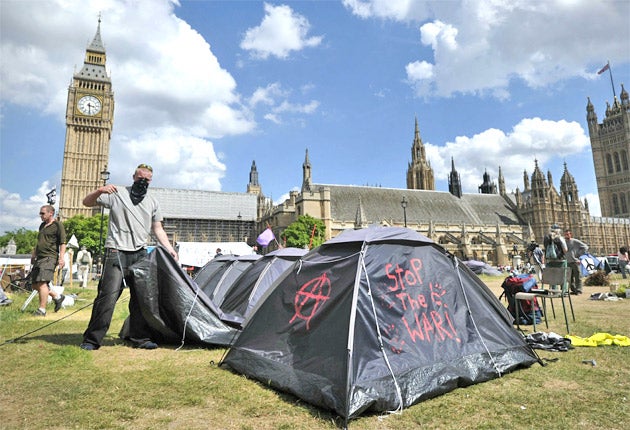Peace protesters ordered out of Parliament Square – but Haw can stay

Your support helps us to tell the story
From reproductive rights to climate change to Big Tech, The Independent is on the ground when the story is developing. Whether it's investigating the financials of Elon Musk's pro-Trump PAC or producing our latest documentary, 'The A Word', which shines a light on the American women fighting for reproductive rights, we know how important it is to parse out the facts from the messaging.
At such a critical moment in US history, we need reporters on the ground. Your donation allows us to keep sending journalists to speak to both sides of the story.
The Independent is trusted by Americans across the entire political spectrum. And unlike many other quality news outlets, we choose not to lock Americans out of our reporting and analysis with paywalls. We believe quality journalism should be available to everyone, paid for by those who can afford it.
Your support makes all the difference.Peace protesters camped across the road from the House of Commons have been ordered to pack up and be gone by the weekend in a court victory for Boris Johnson.
Democracy Village, as it is called, has attracted backing from campaigners for free speech, but Mr Justice Griffith Williams ruled that it is a health hazard and disrupts the right of others not involved in the protest to have access to the green in Parliament Square, London. He delayed the order to clear the camp until 4pm on Friday, to give the protesters time to apply to a Court of Appeal to intervene.
The order does not affect the right of London's best known protester, Brian Haw, to continue the lone vigil he has conducted on the pavement in Parliament Square for nearly 10 years.
But Mr Haw does face the risk of having an injunction served on him if he trespasses on to the grass without the London Mayor's permission. However, he can stay on the pavement because legislation introduced to remove him was not brought in retrospectively and a judge has previously ruled it would be illegal to force him out.
Mr Haw had been sleeping on the grass because of his health.
One of the revelations of the nine-day court hearing was the intense ill feeling and mutual suspicion between different groups squatting in Parliament Square. There are two warring camps – there is Mr Haw and his immediate neighbour, Barbara Tucker, who has been camped alongside him since 2005, and there is Democracy Village, spread over the adjoining lawn.
Not all the occupants of Democracy Village are peace protesters. Some are taking stands against genocide or for the environment, though Afghanistan appears to be the main focus of protest.
In one raucous interlude in the court hearing, a defendant named Charity Sweet, who is allied to Mr Haw and Ms Tucker, applied to have the proceedings stopped on the grounds that the founder of Democracy Village, Maria Gallastegui, is a government agent tasked with creating a provocation to give the authorities a pretext to evict Mr Haw from his pitch. "The application was patently absurd. She adduced no evidence that Ms Gallastegui may have been an agent provocateur," Justice Williams said in yesterday's judgement.
Rebecca Hall, a student at London's South Bank University, headed the list of defendants in the case. She joined Democracy Village on 1 May. She told the judge that it is not a protest but an assembly of people "in which ideas are discussed". Meetings are held twice daily, meals are communal, tasks like cooking and picking litter are shared out, there is a welcome desk for visitors, and relations with police are good.
But Simon Grinter, head of facilities for the Greater London Assembly, complained that flower beds had been trampled, part of the lawn had been dug up to plant an oak tree, flowers and vegetables, there was a makeshift shower with no drainage, and a urinal consisting of a foul smelling bale of hay. He reckoned the damage came to around £50,000.
In his findings, the judge added that: "There is also evidence that the Democracy Village is acting as a magnet for attracting the homeless who are taking advantage of the lack of control and there is heavy drinking."
Some protesters appeared ready to back up and leave before the court imposed deadline expires. But others vowed to stay and resist police attempts to move them.
Join our commenting forum
Join thought-provoking conversations, follow other Independent readers and see their replies
Comments